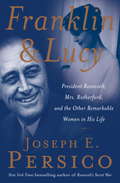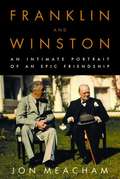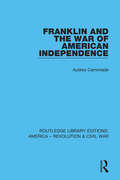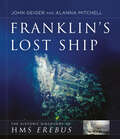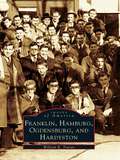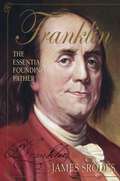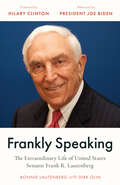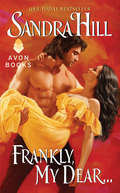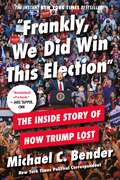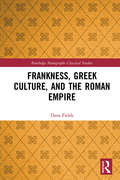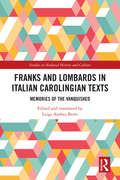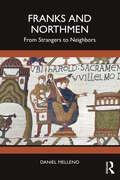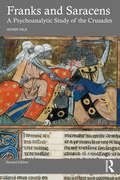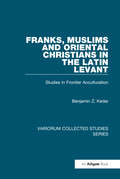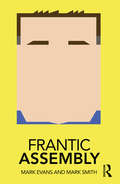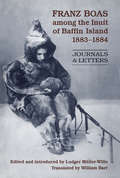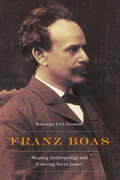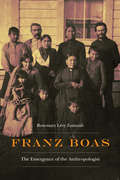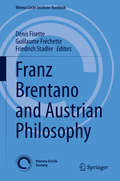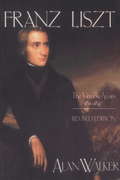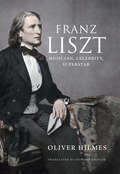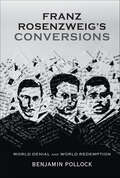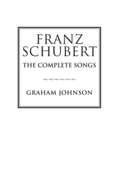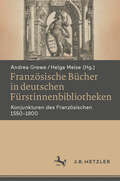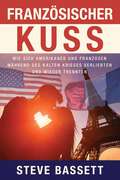- Table View
- List View
Franklin and Lucy: President Roosevelt, Mrs. Rutherfurd, and the Other Remarkable Women in His Life
by Joseph E. PersicoFranklin Delano Roosevelt was arguably the greatest figure of the twentieth century. While FDR's official circle was predominantly male, it was his relationships with women--particularly with Lucy Mercer Rutherfurd--that most vividly bring to light the human being beneath this towering statesman. It is no coincidence that Rutherfurd was with Roosevelt the day he died in Warm Springs, Georgia, along with two other close women companions. In Franklin and Lucy, acclaimed author and historian Joseph E. Persico explores FDR's romance with Lucy Rutherfurd, which was far deeper and lasted much longer than was previously acknowledged. Persico's provocative conclusions about their relationship are informed by a revealing range of sources, including never-before-published letters and documents from Lucy Rutherfurd's estate that attest to the intensity and scope of the affair.FDR's connection with Lucy also creates an opportunity for Persico to take a more penetrating look at the other women in FDR's life. We come to see more clearly how FDR's infidelity as a husband contributed to Eleanor's eventual transformation from a repressed Victorian to perhaps the greatest American woman of her century; how the shaping hand of FDR's strong-willed mother helped to imbue him with the resolve to overcome personal and public adversity throughout his life; and how other women around FDR, including his "surrogate spouse," Missy LeHand, and his close confidante, the obscure Margaret "Daisy" Suckley, completed the world that he inhabited. Franklin and Lucy is an extraordinary look at the private life of a leader who continues to fascinate scholars and the general public alike. In focusing on Lucy Rutherfurd and the myriad women who mattered to Roosevelt, Persico paints a more intimate portrait than we have heretofore had of this enigmatic giant of American history.
Franklin and Winston: An Intimate Portrait of an Epic Friendship
by Jon MeachamNEW YORK TIMES BESTSELLER • In this &“beautifully written and superbly researched dual biography&” (Los Angeles Times Book Review), Pulitzer Prize–winning biographer Jon Meacham &“paints a powerful portrait of the enormous friendship between World War II allies [Franklin] Roosevelt and [Winston] Churchill&” (Vanity Fair). &“Intense and compelling reading.&”—The Washington PostFranklin Roosevelt and Winston Churchill were the greatest leaders of &“the Greatest Generation.&” In Franklin and Winston, Jon Meacham explores the fascinating relationship between the two men who piloted the free world to victory in World War II. Born in the nineteenth century and molders of the twentieth and twenty-first, Roosevelt and Churchill had much in common. In their own time both men were underestimated, dismissed as arrogant, and faced skeptics in their own nations—yet both magnificently rose to the central challenges of the twentieth century. Theirs was a kind of love story, with an emotional Churchill courting an elusive Roosevelt. The British prime minister, who rallied his nation in its darkest hour, standing alone against Adolf Hitler, was always somewhat insecure about his place in FDR&’s affections—which was the way Roosevelt wanted it. A man of secrets, FDR liked to keep people off balance, including his wife, Eleanor, his White House aides—and Winston Churchill.Meacham&’s sources—including unpublished letters of FDR&’ s great secret love, Lucy Mercer Rutherfurd, the papers of Pamela Churchill Harriman, and interviews with people who were in FDR and Churchill&’s joint company—shed light on the characters of both men as he engagingly chronicles the hours in which they decided the course of the struggle.Charting the personal drama behind the discussions of strategy and statecraft, Meacham has written the definitive account of the most remarkable friendship of the modern age.
Franklin and the War of American Independence
by Audrey CammiadeOriginally published in 1967 this book tells the full story of the breach between the United States and Great Britain and the pivotal role played by Benjamin Franklin in both the declaration of independence and the American Treaty. Accessibly written, and richly illustrated with half-tones and maps, this is an introductory text which will be of use to both A Level students and as an introductory text for under-graduates.
Franklin's Lost Ship: The Historic Discovery of HMS Erebus
by John Geiger Alanna MitchellThe greatest mystery in all of exploration is the fate of the 1845–1848 British Arctic Expedition commanded by Sir John Franklin. All 129 crewmen died, and the two ships seemingly vanished without a trace. The expedition's destruction was a mass disaster spread over two years. With the vessels beset and abandoned, the crew confronted a horrific ordeal. They suffered from lead poisoning, were stricken with scurvy and, ultimately, resorted to cannibalism in their final days. The mysterious fate of the ships, HMS Erebus and HMS Terror, has captured the public's imagination for seventeen decades. Now, one of Franklin's lost ships has been found. During the summer of 2014, the Victoria Strait Expedition, the largest effort to find the ships since the 1850s, was led by Parks Canada in partnership with the Arctic Research Foundation, The Royal Canadian Geographical Society, and other public and private partners. The expedition used world-leading technology in underwater exploration and succeeded in a major find—the discovery of Erebus. News of the discovery made headlines around the world. In this fully illustrated account, readers will learn about the exciting expedition, challenging search and the ship's discovery. Featuring the first images of the Erebus, this stunning book weaves together a story of historical mystery and modern adventure.
Franklin, Hamburg, Ogdensburg, and Hardyston: A View Of Sparta, Franklin, Hamburg, Ogdensburg, And Hardyston (Images of America)
by William R. TruranFranklin, Hamburg, Ogdensburg, and Hardyston chronicles the settlement and life of the Wallkill Valley area of northern New Jersey. In rare photographs, the book reveals the history of the people and places in the communities of Franklin, Hamburg, Ogdensburg, and Hardyston. Beginning entirely as Hardyston Township, the area developed into four communities, each with distinctive qualities. Franklin is the "Fluorescent Mineral Capital of the World," as declared by the U.S. Congress, and with its zinc mines, is known as the "Model Mining Town of America." Hamburg from early times was a crossroads and business district. Ogdensburg possessed several mines and Thomas Edison interests. Hardyston, with its lakes for summer visitors and still-thriving farmland, retains the beauty of its natural surroundings.
Franklin: The Essential Founding Father
by James SrodesIn his lifetime, Benjamin Franklin was celebrated all over the Western world. And with good reason, says award-winning biographer James Srodes in his riveting, comprehensively researched portrait of a man he calls "the essential Founding Father." <P><P>Having plumbed archives and other sources neglected by previous biographers, Srodes debunks numerous myths that have gathered about Franklin--many of them spun by other Founding Fathers. Where John Adams--and his biographer David McCullough--had Franklin as indolent and careless, Srodes uses recently discovered documents to show that Franklin was keeping his colleague at arm's length in order to conduct convert activities to help the American cause. Srodes also looks closely at Franklin's reputation as a philanderer and challenges many long-held assumptions. <P><P>Franklin is a fascinating study of a man of ceaseless energies and remarkable accomplishments: an apprentice printer from Boston who made his name and fortune in colonial Philadelphia before having his greatest adventures in Europe's leading capitals, London and Paris. Here we find the complete Franklin--scientist, diplomat, tradesman, author, inventor, celebrated wit, spymaster, propagandist, military leader, quartermaster. Srodes offers extraordinary insight into this complex man, showing us how Franklin's ability to divide his life into discrete compartments enabled him to accomplish so much in so many different areas. <P><P>Of the many roles Franklin, played, he is perhaps most familiar to us as the genius inventor and experimenter. After all, Franklin's electrical experiments earned him the Copley Medal, the eighteenth-century equivalent of the Nobel Prize, and many of his inventions (including bifocals, the lightning rod, and the Franklin stove) are still with us today. But as Srodes shows, Franklin's greatest invention was America, for "it is hard to see how we would be what we are today without the eighty-four-year progress of Benjamin Franklin." <P><P>More than twenty years before the Declaration of Independence, Franklin was the first to put forward a plan to unite the colonies, and he took the lead in challenging King George's authority. One of only six men to sign both the Declaration and the Constitution, he secured the alliance with France that proved essential to America's success in the Revolution. Indeed, one could say that while George Washington won the battles, Benjamin Franklin won the war.
Frankly Speaking: The Extraordinary Life of United States Senator Frank R. Lautenberg
by Bonnie LautenbergFrank Lautenberg was the embodiment of the American dream. The son of Eastern European immigrants who toiled in the factories of northern New Jersey, he rose to become a Fortune 500 CEO and eventually a five-term US senator. Yet his is not a simple rags-to-riches tale, but is rather the story of someone who used his newfound affluence and influence to improve the lives of ordinary Americans. Told by one of the people who knew him best, his widow Bonnie, Frankly Speaking reveals the political strategies that made Lautenberg one of the Senate’s most powerful advocates for the health and safety of America’s citizens. He championed seemingly minor, unglamorous reforms that made a big difference to everyday lives, from raising the national drinking age to preventing domestic abusers from purchasing guns. These campaigns earned him powerful enemies in the alcohol, tobacco, and firearms industries, and he was subjected to some of the most brutal campaign mudslinging in American history. Yet, as this inspiring biography reveals, New Jersey’s longest-serving senator was not afraid to take big political risks if it meant standing up for his principles, whether that meant opposing the Iraq War or protecting LGBTQ and women’s rights.
Frankly, My Dear
by Sandra HillTiring of the pretentious world of high fashion, model Selene heads to New Orleans for one last job and is transported back in time to the Old South, where she meets beguiling planter James Baptiste.
Frankly, We Did Win This Election: The Inside Story of How Trump Lost
by Michael C. BenderMichael C. Bender, senior White House reporter for the Wall Street Journal, presents a deeply reported account of the 2020 presidential campaign that details how Donald J. Trump became the first incumbent in three decades to lose reelection—and the only one whose defeat culminated in a violent insurrection. <P><P>Beginning with President Trump’s first impeachment and ending with his second, FRANKLY, WE DID WIN THIS ELECTION chronicles the inside-the-room deliberations between Trump and his campaign team as they opened 2020 with a sleek political operation built to harness a surge of momentum from a bullish economy, a unified Republican Party, and a string of domestic and foreign policy successes—only to watch everything unravel when fortunes suddenly turned. <P><P>With first-rate sourcing cultivated from five years of covering Trump in the White House and both of his campaigns, Bender brings readers inside the Oval Office, aboard Air Force One, and into the front row of the movement’s signature mega-rallies for the story of an epic election-year convergence of COVID, economic collapse, and civil rights upheaval—and an unorthodox president’s attempt to battle it all. Fresh interviews with Trump, key campaign advisers, and senior administration officials are paired with an exclusive collection of internal campaign memos, emails, and text messages for scores of never-before-reported details about the campaign. <P><P>FRANKLY, WE DID WIN THIS ELECTION is the inside story of how Trump lost, and the definitive account of his final year in office that draws a straight line from the president’s repeated insistence that he would never lose to the deadly storming of the U.S. Capitol that imperiled one of his most loyal lieutenants—his own vice president. <P><P><b>A New York Times Best Seller</b>
Frankness, Greek Culture, and the Roman Empire (Routledge Monographs in Classical Studies)
by Dana FieldsFrankness, Greek Culture, and the Roman Empire discusses the significance of parrhēsia (free and frank speech) in Greek culture of the Roman empire. The term parrhēsia first emerged in the context of the classical Athenian democracy and was long considered a key democratic and egalitarian value. And yet, references to frank speech pervade the literature of the Roman empire, a time when a single autocrat ruled over most of the known world, Greek cities were governed at the local level by entrenched oligarchies, and social hierarchy was becoming increasingly stratified. This volume challenges the traditional view that the meaning of the term changed radically after Alexander the Great, and shows rather that parrhēsia retained both political and ethical significance well into the Roman empire. By examining references to frankness in political writings, rhetoric, philosophy, historiography, biographical literature, and finally satire, the volume also explores the dynamics of political power in the Roman empire, where politics was located in interpersonal relationships as much as, if not more than, in institutions. The contested nature of the power relations in such interactions - between emperors and their advisors, between orators and the cities they counseled, and among fellow members of the oligarchic elite in provincial cities - reveals the political implications of a prominent post-classical intellectual development that reconceptualizes true freedom as belonging to the man who behaves - and speaks - freely. At the same time, because the role of frank speaker is valorized, those who claim it also lay themselves open to suspicions of self-promotion and hypocrisy. This volume will be of interest to students and scholars of rhetoric and political thought in the ancient world, and to anyone interested in ongoing debates about intellectual freedom, limits on speech, and the advantages of presenting oneself as a truth-teller.
Franks and Lombards in Italian Carolingian Texts: Memories of the Vanquished (Studies in Medieval History and Culture)
by Luigi Andrea BertoFranks and Lombards in Italian Carolingian Texts examines how historians of Carolingian Italy portrayed the history of the Lombards, Charlemagne’s conquest of the Lombard kingdom, and the presence of the Franks in the Italian Ppeninsula. The different contexts and periods in which these writers composed their works allows readers to focus on various aspects of this period and to highlight the different ways the vanquished remembered Carolingian rule in Italy. The ‘"memories’" of these authors are organized by topic, ranging from the origin of the Lombards to the conflicts that broke out among the Carolingians after Louis II died in 875. Besides presenting the English translation and the original Latin text of the excerpts from the Italian Carolingian historical works, the volume also contains the English translations of the same events recorded in Frankish and papal narrative texts. In this way it is possible to compare different memories about the same episode or topic. The book will appeal to scholars and students of the Lombards and Carolingians, as well as all those interested in medieval Europe.
Franks and Northmen: From Strangers to Neighbors
by Daniel MellenoFranks and Northmen explores the full spectrum of Franco-Scandinavian interaction, examining not just violence but also less well-known relationships centered on acts of diplomacy, commerce, and mission and demonstrating the transformative nature of cross-cultural encounter during the Viking Age.In the year 777, the Frankish sources mention the Northmen, better known to most as the Vikings, for the first time. By the tenth century these Northmen, once a mysterious people on the borders of the Carolingian Empire, would be a familiar presence in the Frankish world. As raiders and pillagers, the Vikings would fill the pages of Frankish authors, leaving a legacy that continues to fascinate even to the twenty-first century. But a closer look at sources, both textual and material, reveals that the relationships between Franks and Northmen were far more complex and multifaceted than a rigid focus on Viking violence might suggest. Merchants carried goods across the North Sea, missionaries encouraged new ways of understanding the world, and Franks and Northmen formed relationships and bonds even amidst conflict and violence.This study is a useful resource for both students and specialists of central and northern Europe in the early medieval period.
Franks and Saracens: A Psychoanalytic Study of the Crusades
by Avner FalkFranks and Saracens is the first and only book to examine the Crusades from the viewpoint of psychoanalysis, studying the hidden emotions and fantasies that drove the Crusaders and the Muslims to undertake their terrible wars.Using original documents as well as secondary sources, Avner Falk demonstrates that the deepest and most powerful motives for the Crusades were not only religious or territorial – or the quest for lands, wealth, or titles – but also unconscious emotions and fantasies about one's country, one's religion, one's enemies, God and the Devil, Us and Them. The book demonstrates the collective inability to mourn large-group losses, and the collective needs of large groups such as nations and religions to develop a clear identity, to have boundaries, and to have enemies and allies. Falk investigates the unconscious dynamics of the Crusades, both on the individual and on the collective level, to understand why the Crusading fantasies persisted for nearly two centuries, and why the “northern Crusades” went on until the early fifteenth century. This updated edition adds a new chapter on collective trauma both as cause and as consequence of the Crusades and has been fully revised to include literature on trauma and other psychological aspects of the Crusades.Franks and Saracens will be of great interest to historians, political scientists, medievalists, psychologists, psychiatrists, psychoanalysts, anthropologists, and sociologists interested in questions of conflict, fantasy, and identity, collective psychological processes, and to academics of the Crusades and military history.
Franks, Muslims and Oriental Christians in the Latin Levant: Studies in Frontier Acculturation (Variorum Collected Studies)
by Benjamin Z. KedarSteven Runciman characterized intellectual life in the Frankish Levant as 'disappointing'; Joshua Prawer claimed that the Franks refused to open up to the East's intellectual achievements. The present collection, the second by Benjamin Kedar in the Variorum series, presents facts that require a modification of these still largely prevailing views. The earliest laws of the Kingdom of Jerusalem were influenced by Byzantine legislation; medical routine in the Jerusalem Hospital, unparalleled in Europe, had counterparts in Oriental hospitals; worshippers of different creeds repeatedly converged; multi-directional conversion recurred time after time. Several articles deal with groups that did abstain from intercultural contacts: Muslim villagers, Frankish clerics and hermits. One article dwells on the asymmetry of Frankish and Muslim mutual perceptions. The volume concludes with studies of specific locations: one argues that Acre was considerably larger than hitherto assumed, another compares its Venetian and Genoese quarters and attempts to locate the remains of a main street, a third reconstructs the history of Caymont.
Frantic Assembly (Routledge Performance Practitioners)
by Mark Smith Mark EvansFrantic Assembly have had a powerful and continuing influence on the popularisation of devising practices in contemporary theatre-making. Their work blends brave and bold physical theatre with exciting new writing, and they have collaborated with some of the leading theatre-makers in the UK. The company’s impact reaches throughout the world, particularly through their extensive workshop and education programmes, as well as their individual and collective impact as movement directors on landmark, internationally successful productions such as Black Watch and The Curious Incident of the Dog in the Night-Time. This volume reveals the background to, and work of, a major influence on twentieth and twenty-first century performance. Frantic Assembly is the first book to combine: an overview of the history of the company since its foundation in 1994 an analysis of the key ideas underpinning the company’s work a critical commentary on two key productions – Hymns by Chris O’Connell (1999) and Stockholm by Bryony Lavery (2007) a detailed description of a Frantic Assembly workshop, offering an introduction to how the company works. As a first step towards critical understanding, and as an initial exploration before going on to further, primary research, Routledge Performance Practitioners offer unbeatable value for today’s student.
Franz Boas among the Inuit of Baffin Island, 1883-1884: Journals and Letters
by William Barr Ludger Muller-WilleIn the summer of 1883, Franz Boas, widely regarded as one of the fathers of Inuit anthropology, sailed from Germany to Baffin Island to spend a year among the Inuit of Cumberland Sound. This was his introduction to the Arctic and to anthropological fieldwork. This book presents, for the first time, his letters and journal entries from the year that he spent among the Inuit, providing not only an insightful background to his numerous scientific articles about Inuit culture, but a comprehensive and engaging narrative as well. Using a Scottish whaling station as his base, Boas travelled widely with the Inuit, learning their language, living in their tents and snow houses, sharing their food, and experiencing their joys and sorrows. At the same time he was taking detailed notes and surveying and mapping the landscape and coastline. Ludger Müller-Wille has transcribed his journals and his letters to his parents and fiancé and woven these texts into a sequential narrative. The result is a fascinating study of one of the earliest and most successful examples of participatory observation among the Inuit. Originally published in German in 1994, the text has been translated into English by William Barr, who has also published translations of other important works on the history of the Arctic. Illustrated with some of Boas's own photos and with maps of his field area, Franz Boas among the Inuit of Baffin Island, 1883-1884 is a valuable addition to the historical and anthropological literature on southern Baffin Island.
Franz Boas: Shaping Anthropology and Fostering Social Justice (Critical Studies in the History of Anthropology)
by Rosemary Lévy ZumwaltFranz Boas defined the concept of cultural relativism and reoriented the humanities and social sciences away from race science toward an antiracist and anticolonialist understanding of human biology and culture. Franz Boas: Shaping Anthropology and Fostering Social Justice is the second volume in Rosemary Lévy Zumwalt&’s two-part biography of the renowned anthropologist and public intellectual. Zumwalt takes the reader through the most vital period in the development of Americanist anthropology and Boas&’s rise to dominance in the subfields of cultural anthropology, physical anthropology, ethnography, and linguistics. Boas&’s emergence as a prominent public intellectual, particularly his opposition to U.S. entry into World War I, reveals his struggle against the forces of nativism, racial hatred, ethnic chauvinism, scientific racism, and uncritical nationalism. Boas was instrumental in the American cultural renaissance of the 1920s and 1930s, training students and influencing colleagues such as Melville Herskovits, Zora Neale Hurston, Benjamin Botkin, Alan Lomax, Langston Hughes, and others involved in combating racism and the flourishing Harlem Renaissance. He assisted German and European émigré intellectuals fleeing Nazi Germany to relocate in the United States and was instrumental in organizing the denunciation of Nazi racial science and American eugenics. At the end of his career Boas guided a network of former student anthropologists, who spread across the country to university departments, museums, and government agencies, imprinting his social science more broadly in the world of learned knowledge.Franz Boas is a magisterial biography of Franz Boas and his influence in shaping not only anthropology but also the sciences, humanities, social science, visual and performing arts, and America&’s public sphere during a period of great global upheaval and democratic and social struggle.
Franz Boas: The Emergence of the Anthropologist (Critical Studies in the History of Anthropology)
by Rosemary Lévy ZumwaltRosemary Lévy Zumwalt tells the remarkable story of Franz Boas, one of the leading scholars and public intellectuals of the late nineteenth and early twentieth centuries. The first book in a two-part biography, Franz Boas begins with the anthropologist’s birth in Minden, Germany, in 1858 and ends with his resignation from the American Museum of Natural History in 1906, while also examining his role in training professional anthropologists from his berth at Columbia University in New York City. Zumwalt follows the stepping-stones that led Boas to his vision of anthropology as a four-field discipline, a journey demonstrating especially his tenacity to succeed, the passions that animated his life, and the toll that the professional struggle took on him. Zumwalt guides the reader through Boas’s childhood and university education, describes his joy at finding the great love of his life, Marie Krackowizer, traces his 1883 trip to Baffin Land, and recounts his efforts to find employment in the United States. A central interest in the book is Boas’s widely influential publications on cultural relativism and issues of race, particularly his book The Mind of Primitive Man (1911), which reshaped anthropology, the social sciences, and public debates about the problem of racism in American society.Franz Boas presents the remarkable life story of an American intellectual giant as told in his own words through his unpublished letters, diaries, and field notes. Zumwalt weaves together the strands of the personal and the professional to reveal Boas’s love for his family and for the discipline of anthropology as he shaped it.
Franz Brentano and Austrian Philosophy (Vienna Circle Institute Yearbook #24)
by Friedrich Stadler Denis Fisette Guillaume FréchetteThe book discusses Franz Brentano’s impact on Austrian philosophy. It contains both a critical reassessment of Brentano’s place in the development of Austrian philosophy at the turn of the 20th century and a reevaluation of the impact and significance of his philosophy of mind or ‘descriptive psychology’ which was Brentano's most important contribution to contemporary philosophy and to the philosophy in Vienna. In addition, the relation between Brentano, phenomenology, and the Vienna Circle is investigated, together with a related documentation of Brentano's disciple Alfred Kastil (in German). The general part deals with the ongoing discussion of Carnap's "Aufbau" (Vienna Circle Lecture by Alan Chalmers) and the philosophy of mind, with a focus on physicalism as discussed by Carnap and Wittgenstein (Gergely Ambrus). As usual, two reviews of recent publications in the philosophy of mathematics (Paolo Mancosu) and research on Otto Neurath's lifework (Jordi Cat/Adam Tuboly) are included as related research contributions. This book is of interest to students, historians, and philosophers dealing with the history of Austrian and German philosophy in the 19th and 20th century.
Franz Liszt, Volume 1
by Alan WalkerThe first volume in Alan Walker's magisterial biography of Franz Liszt.
Franz Liszt: Musician, Celebrity, Superstar
by Oliver Hilmes Stewart SpencerAn engrossing new biography of the musical revolutionary who was the world's first international megastar Hungarian composer Franz Liszt (1811-1886) was an anomaly. A virtuoso pianist and electrifying showman, he toured extensively throughout the European continent, bringing sold-out audiences to states of ecstasy while courting scandal with his frequent womanizing. Drawing on new, highly revealing documentary sources, including a veritable treasure trove of previously unexamined material on Liszt's Weimar years, best-selling author Oliver Hilmes shines a spotlight on the extraordinary life and career of this singularly dazzling musical phenomenon. Whereas previous biographies have focused primarily on the composer's musical contributions, Hilmes showcases Liszt the man in all his many shades and personal reinventions: child prodigy, Romantic eccentric, fervent Catholic, actor, lothario, celebrity, businessman, genius, and extravagant show-off. The author immerses the reader in the intrigues of the nineteenth-century European glitterati (including Liszt's powerful patrons, the monstrous Wagner clan) while exploring the true, complex face of the artist and the soul of his music. No other Liszt biography in English is as colorful, witty, and compulsively readable, or reveals as much about the true nature of this extraordinary, outrageous talent.
Franz Rosenzweig's Conversions: World Denial and World Redemption
by Benjamin PollockFranz Rosenzweig's near-conversion to Christianity in the summer of 1913 and his subsequent decision three months later to recommit himself to Judaism is one of the foundational narratives of modern Jewish thought. In this new account of events, Benjamin Pollock suggests that what lay at the heart of Rosenzweig's religious crisis was not a struggle between faith and reason, but skepticism about the world and hope for personal salvation. A close examination of this important time in Rosenzweig's life, the book also sheds light on the full trajectory of his philosophical development.
Franz Schubert: The Complete Songs
by Graham JohnsonThis three-volume boxed set is the definitive work on Franz Schubert’s vocal music with piano. A richly illustrated encyclopedia, these substantial volumes contain more than seven hundred song commentaries with parallel text and translations (by Richard Wigmore), detailed annotations on the songs’ poetic sources, and biographies of one hundred and twenty poets, as well as general articles on accompaniment, tonality, transcriptions, singers, and more. Written by Graham Johnson—celebrated accompanist, author, and the first pianist ever to record all of Schubert’s songs and part-songs—this sumptuous work is a must for performers, scholars, and all lovers of Schubert lieder.
Französische Bücher in deutschen Fürstinnenbibliotheken: Konjunkturen des Französischen 1550‒1800
by Andrea Grewe Helga MeiseDie Beiträge des Bandes verbinden auf innovative Weise genderwissenschaftliche Perspektiven mit bibliotheks- und literaturwissenschaftlichen Fragestellungen und liefern neue Einsichten in die Bedingungen des deutsch-französischen Kulturtransfers zwischen dem 16. und 18. Jahrhundert. Ausgehend vom Konzept der 'Living Library' (Sherman) und der Bibliothek als 'Organismo vivente' (Eco) analysieren die Beiträge einerseits die Prägung der Fürstinnenbibliotheken durch die spezifische Lebenssituation und die dynastische Einbindung ihrer Besitzerinnen; andererseits arbeiten sie gruppen- und zeitspezifische Gründe für das Sammeln von Büchern in französischer Sprache heraus. Die Bibliothek wird damit als ein zentraler Ort des deutsch-französischen Kulturtransfers erkennbar, ein Prozess, der von so unterschiedlichen Faktoren wie der Rezeption calvinistischer Literatur an den reformierten Höfen des Reichs, dem Interesse an moderner französischer Romanliteratur und der Funktion des Französischenals Mittlersprache für Literatur aus anderen Sprachen geprägt wird. Indem die Bibliotheken als Zeugnisse einer 'Literaturgeschichte des Gelesenen' (Paul Raabe) analysiert werden, zeichnet sich ein zeitgenössischer Lektürekanon ab, der den Kanon moderner Literaturgeschichtsschreibung in Frage stellt und die Vorreiterrolle französischer Autorinnen des 17. und 18. Jahrhunderts in der Lektürepraxis der Zeit sichtbar werden lässt.
Französischer Kuss: Wie sich Amerikaner und Franzosen während des Kalten Krieges verliebten und wieder trennten
by Steve BassettDie Geschichte von Châteauroux ist geprägt von den unauslöschlichen Spuren der amerikanischen Präsenz. Als die ersten Piloten der amerikanischen Armee 1917, kurz vor dem Ende des Ersten Weltkriegs, zur La Martinerie Air Base in Châteauroux kamen, hätten sie zweifellos nie gedacht, dass sie der Beginn einer Liebesbeziehung zwischen Berry und dem Star sein würden, die ein halbes Jahrhundert dauerte -Geschmücktes Spruchband. Als die Amerikaner 50 Jahre später zusammen mit allen anderen NATO-Truppen aus Frankreich abzogen, verursachte dies ein echtes Trauma in der Stadt, sowohl im Geiste als auch im Alltag. Seitdem hat sich vieles verändert. Der Schmerz verging mühsam, bei manchen eitern die Wunden noch, aber das Jahrhundert hat sich geändert. Châteauroux baute sich neu auf und entwickelte sich weiter, um endlich eine wichtige Stadt im neuen Europa zu werden. Steve Bassetts Buch zeigt, dass jenseits des Atlantiks in einer Provinzstadt Frankreichs die Erinnerung an diese amerikanische Zeit sehr langlebig ist, ein Beweis unserer unbestreitbaren Liebe zu dieser großartigen Nation, die die Vereinigten Staaten von Amerika sind.
